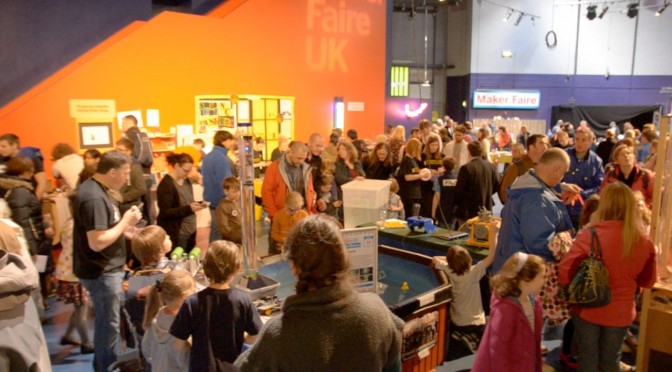At last week’s Science Communication Conference, I joined a plenary panel to discuss what’s changed in the 12 years the conference has been running. I’ve been kicking around in the sector for more like 25 years so I played a bit fast and loose with the timescale, but my little spot in the limelight went more-or-less as follows:
Tag Archives: scicomms
Are demos in decline?
As hands-on science communicators, we live and breathe our demos. We hone, improvise and improve them over years, even decades. Few things please us more than an evening in good company discussing and dissecting the demos that work and why. In our world, science communicators usually have a favourite demo or five.
I work with a lot of new science communicators. Many of them are top class new graduates with a science background, and I love to ask them ‘What’s your favourite demo?’. It’s fascinating to this jaded old sock. Gone, alas, are the days where every week brought an exciting new concept for me to play with. I can share this excitement vicariously, of course. I get to delight other people afresh, but I love the extra insight I get quizzing someone who’s new to this world. With bright eyes and keen minds what are they looking for in a good old-fashioned demonstration?
What I find interesting is that in the last few years not as many of our new recruits seem confident in their answers. I find myself giving hints as to what I mean by ‘demonstration’ – not an experiment, a practical nor a trick: a science demonstration.
Are they simply unfamiliar with this jargon or is something more sinister afoot?
Is the delight of the demonstration becoming a dark art, practiced more by a growing band of science communicators but less by teachers and lecturers? Perhaps demonstrations are seen as entertaining quirks in a social context, shared via Facebook and YouTube, and not as teaching tools in an academic world.
I may be reading too much into this, of course. My sample is small and could represent a gentle blip within the boundaries of standard deviation with no rhyme, reason nor correlation. I’d be interested to hear if others have noticed a trend.
MAKE | Maker Faire UK: Interview with Artist Giles Walker
I want ScienceDemo.org to be about demos, yes, but also about issues surrounding demos – how and why we do them, to whom, and to what end. So here we go. Make have an interview with a guy who’s exhibiting pole-dancing, CCTV-headed robots at Maker Faire UK this weekend. Worth a read:
One of the things we discuss rather a lot in science communication circles is how to shift science and engineering further into mainstream culture. While the likes of Festival of the Spoken Nerd are taking great strides, it’s still notable that, for example, the ‘Cultural Olympiad’ surrounding last year’s London Olympics laughed all over the idea that STEM could be ‘cultural.’
This is one of the reasons I think Maker Faire is important. I’ve said before that while many STEM engagement projects are about STEM as career choice, Maker Faire comes from a completely different community and set of sensibilities. If it’s about STEM at all, it’s about STEM as lifestyle choice.
Maker Faire is chaotic, noisy, messy, and more than a little bewildering. It’s also joyous, inspiring, friendly, and pleasantly challenging. In my opinion it should be required reading on scicomms MSc courses, precisely because of that anarchic joy – it’s what happens when you take similar ideas to public engagement but develop them with a completely different group of people coming from a completely different viewpoint. In many ways, I prefer their interpretation of how things could be.
There’s a danger, I think, of the Cheltenham Science Festival and its ilk coming to represent ‘authorised’ science communication, and anything else being regarded with an air of suspicion (sometimes, when I’m hanging out with the London scicomms set, I wonder if this has already happened). There’s an orthodoxy to the sector which risks becoming bland. Maker Faire is doing a different job for a different audience, but the approach is so radical I think everyone should see it. Yet the usual scicomms community is notable largely for its absence. What should be worrying for them, I think, is how little they’re missed.
We’re not going to take STEM into mainstream culture unless we take the cultural sector seriously, and come to understand it on its own terms. Maker Faire UK is by far the best place to see the collision and interaction of the ‘two cultures.’ It’s a huge hit regionally, but I wish more of the opinion-makers and leaders made the arduous journey north to see it for themselves, and have their assumptions challenged.
Maker Faire UK runs April 27/28th at the Centre for Life, Newcastle. Details.

